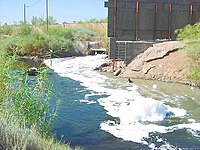
Photo from wikipedia
Wastewater contains considerable amounts of thermal energy. Heat recovery from wastewater in buildings could supply cities with an additional source of renewable energy. However, variations in wastewater temperature influence the… Click to show full abstract
Wastewater contains considerable amounts of thermal energy. Heat recovery from wastewater in buildings could supply cities with an additional source of renewable energy. However, variations in wastewater temperature influence the performance of the wastewater treatment plant. Thus, the treatment is negatively affected by heat recovery upstream of the plant. Therefore, it is necessary to develop more accurate models of the wastewater temperature variations. In this work, a computational model based on artificial neural network (ANN) is proposed to calculate wastewater treatment plant influent temperature concerning ambient temperature, building effluent temperature and flowrate, stormwater flowrate, infiltration flowrate, the hour of day, and the day of year. Historical data related to the Stockholm wastewater system are implemented in MATLAB software to drive the model. The comparison of calculated and observed data indicated a negligible error. The main advantage of this ANN model is that it only uses historical data commonly recorded, without any requirements of field measurements for intricate heat transfer models. Moreover, Monte Carlo sensitivity analysis determined the most influential parameters during different seasons of the year. Finally, it was shown that installing heat exchangers in 40% of buildings would reduce 203 GWh year −1 heat loss in the sewage network. However, heat demand in WWTP would be increased by 0.71 GWh year −1 , and the district heating company would recover 176 GWh year −1 less heat from treated water.
Journal Title: Sustainability
Year Published: 2020
Link to full text (if available)
Share on Social Media: Sign Up to like & get
recommendations!